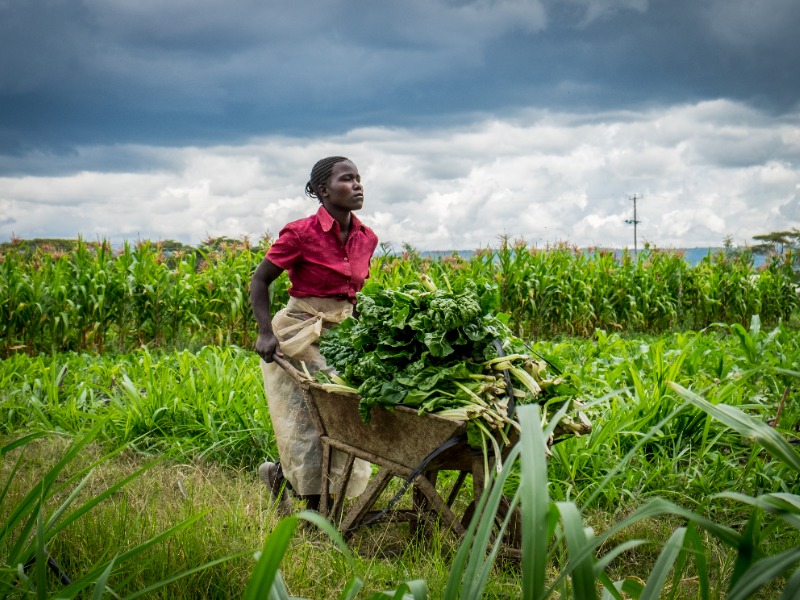Small and medium enterprises (SMEs) play a significant role in most economies, particularly in developing countries. SMEs account for most businesses worldwide and are important contributors to job creation and global economic development. They represent about 90% of businesses and more than 50% of employment worldwide. Africa is home to over 30 million small and medium enterprises who are an important driving force towards economic growth. In Sub-Saharan Africa these businesses are heavily involved in agricultural activities and contribute largely to the food supply and retail industry. Notably, smallholder farmers feed the world – it is estimated that 70% of the food consumed in Sub-Saharan Africa is produced by smallholder farmers. However, in most African countries, less than five percent of net bank lending goes to agriculture which leaves many smallholder farmers particularly underserved. If these farmers had easier, better access to financial products and services, they would be able to save, borrow, and transfer money more easily, safely, and economically.
Notably, over the last few years, we have seen reputable international non-governmental organisations, development organisations, fintechs and financial institutions making strides to unlock the potential of smallholder farmers through heavily funded financial inclusion initiatives. Whilst these investments are prominent, we need to ask whether these efforts have significantly driven financial inclusion in Sub-Saharan Africa. Therefore, in addressing the important role of financial inclusion, it is necessary to address the investments involved, challenges faced by smallholder farmers and opportunities in rural agriculture finance.
Investments in Financial Inclusion
The Mastercard Foundation has spent millions of Dollars to find, support, help to scale up, and learn from innovative ideas that expand financial inclusion to smallholder farmers and other economically disadvantaged people living in rural Africa. In 2015, the foundation launched a US$50 million challenge fund to improve the lives of smallholder farmers in Africa by enabling businesses to begin or expand financial services in rural areas of Sub-Saharan Africa. As a result, in 2017 Mercy Corps, in partnership with the Mastercard Foundation, launched the AgriFin Accelerate in Zambia, one of three countries in Africa where the program operated. AgriFin Accelerate focused on helping to close the gap in access to financial and information services experienced by smallholder farmers, especially women and youth. The US$25 million, six-year initiative which ended in 2021 benefited over one Million smallholder farmers in Zambia, Kenya, and Tanzania.
The Challenges
Most financial players have no clear business cases to serve the unbanked and underserved smallholder farmers, and as a result have had little interest in providing custom-tailored services for them.
The challenges are immense on the smallholder and small enterprise side. Most of these farmers depend solely on agriculture for their livelihood and as an income earner. Consequently, they experience challenges during pre- and post-harvest seasons, which have proven to be stumbling blocks to increasing their incomes and productivity levels. The main challenges faced include unanticipated financial needs such as lack of access to a wide variety of financial solutions including, payments, savings, and lack of capital due to insufficient credit history thus limiting their abilities to grow their businesses and scale up. The lack of access to premium and stable markets, post-harvest technologies, storage facilities, quality inputs, skills development, accurate information on weather, and insurance are further inhibiting the growth of these “unsung heroes.”
Digital Finance Innovations as Enablers
Technologically powered solutions have the power to eradicate the barriers that smallholder farmers face. Today, digital finance solutions have driven financial inclusion across various regions of Sub-Saharan Africa with an increase in mobile money penetration, mobile wallet usage and agency banking to meet their financial needs. However, despite the milestones smallholder farmers continue to be neglected or underserved because they do not offer commercial viability to Financial Service Providers (FSPs) especially banks, mobile network operators (MNOs) and fintechs. In comparison to other sectors such as retail and E-commerce, the cost of development, deployment, and service delivery of these solutions to rural areas is very high. In addition, many smallholder farmers lack expertise and knowledge in the usage of financial products, which increases the costs of onboarding them.
Despite these challenges Africa continues to record significant growth in terms of the number of digital finance solutions targeted at smallholder farmers. On the other hand, these solutions are mostly private sector led with support from donors and are focused on temporarily addressing the common pain points through the provision of low cost or zero-rated financial services. In the short-term donors help to design and develop solutions, and may subsidise the financial costs, but in the long run these solutions become unsustainable for the FSPs who cannot continually offer concessionary rates to farmers. As a result, the mismatch between smallholder farmers’ needs and FSP’s abilities to provide viable solutions turn out to be unprofitable.
One of the greatest enablers for financial inclusion is technology and innovations. For the smallholder businesses to thrive we must encourage lower costs through interoperability among industry players including banks, MNOs, agriculture organisations, information hubs, donor organisations, grant-aided institutions, and third-party industry partners.
Amidst the global pandemic of COVID – 19 which has seen the proliferation of cashless services, there is need for collaboration between government, FSPs, and industry players through provision of shared solutions, platforms, networks, and infrastructure which can reduce barriers to financial inclusion, and subsequently the cost of doing business for smallholder farmers, including the costs of sending and receiving money.
In due course, availability of infrastructure should help with easing market penetration for smallholder farmers especially those in hard-to-reach areas. Other enhancers include:
- Support with regulation compliance through a relaxed regulatory approach to allow for delivery of alternate channels for affordable (low cost) solutions that help smallholder farmers.
- Adoption of digital finance solutions and services to streamline farming, business and financial processes which are important in addressing various challenges that smallholder farmers face from pre to post harvest.
- Access to data on smallholder farmers to help provide more customer-centric products and value-added services suited for smallholder farmers such as payments, savings, loans, crop and weather index insurance, market prices, and best practices.

Opportunities for Financial Services Players
Today Fintechs are rapidly changing the dynamics of the financial services sector. They have the required impetus to help boost financial inclusion by reducing costs, customising services down to the individual level, and widening the range and outreach of providers. Therefore, leveraging on bank and fintech Partnerships can help SMEs digitise their businesses and build a platform for sustained development.
A holistic digital proposition targeted at smallholder farmers and Agri-SMEs can enhance payments acceptance options and unlock their business growth potential by enabling them to tap into diverse opportunities brought about by the digital payment ecosystem. The Zambia National Commercial Bank (Zanaco), the leading commercial bank in Zambia partnered with the Mastercard Foundation funded Mercy Corps’ AgriFin Accelerate Project to design and develop the first bank-led digital financial services (DFS) product specifically designed for smallholder farmers in Zambia. The AgriPay account is a holistic customer value proposition that provides a suite of financial services including payments, peer to peer transfers, bill payments, savings, and lending, access to markets, and free learning.
Other partners that supported the initiative include financial sector deepening Zambia who provided funding for onboarding of women and youth onto the platform, Musika who provided financial support for training, marketing, and Business Development Consultancy, and the United Nations Capital Development Fund (UNCDF) who funded the go-to-market strategy through the booster model programme. AgriPay is currently helping more than 7,000 smallholders in Zambia with access to affordable financial services, and value-added services such as the Learn component that enables farmers to access financial literacy and agronomic information on their feature phones via a USSD platform. Zanaco also partnered with Zambian Breweries, a subsidiary of AB InBev and paid out over 1,000 sorghum farmers through BanQu, a blockchain-based platform that provides farmers with access to digital payments and technology by recording all transactions to improve sustainability and productivity across the supply chain thus giving the farmer a digital identity.
In addressing the lack of access to markets, the World Food Programme, Digital PayGo and Zanaco partnered to develop a virtual marketplace for smallholder farmers called Maano. Maano is an agriculture trading platform that provides access to premium markets, pricing, logistics services, weather index insurance and corporate bulk payments services among other services. So far Digital Paygo has managed to onboard 13,000 smallholders out of a total target of 50,000 at the end of 2022.
It is such approaches that target the entire ecosystem and smallholder value chains that can help solve the problems that smallholder farmers and Agri-SMEs face through the provision of blended services using a holistic approach.
What Next
The outbreak of the COVID-19 pandemic has heightened consumer and regulatory preferences for cashless payment platforms, even though many small businesses do not have the resources and infrastructure to facilitate these kinds of transactions. Therefore, through the deployment of innovative and secure solutions by Banks, MNOs and Fintechs, the underserved smallholder farmers and Agri-SMEs will be able to pivot their businesses, whereas aligning them to growing consumer needs to use digital payments and do so safely and conveniently.
Today, both smallholder farmers and Agri-SMEs have an outsized impact on the economy, providing a livelihood for many, while advancing inclusive growth to reduce poverty and boost prosperity. There is an urgent need for industry cross-cutting solutions that will solve problems faced by underserved populations, as most of the challenges are multi-sectoral and require an ecosystem approach to solve for the entire value chain. In the future, these solutions should also embed value-added features such as invoicing, procuring and logistics, transaction management, cash registration, and ecommerce among others, to make it easier for smallholder farmers and SMEs to increase their productivity and income levels, and contribute to sustainable economic growth.
References
- https://www.worldbank.org/en/topic/smefinance
- https://www.ifad.org/thefieldreport/
- https://www.mercycorpsagrifin.org/wp-content/uploads/2021/03/4th_Annual_Learning_Event_2019_Report-SP.pdf
- https://www.uncdf.org/article/5431/agripay-brings-digital-banking-to-thousands-of-zambian-farmers
- https://www.musika.org.zm/headlines/zanaco-agripay-digital-banking-platform-poised-to-support-growth-of-smallholder-farmers/



